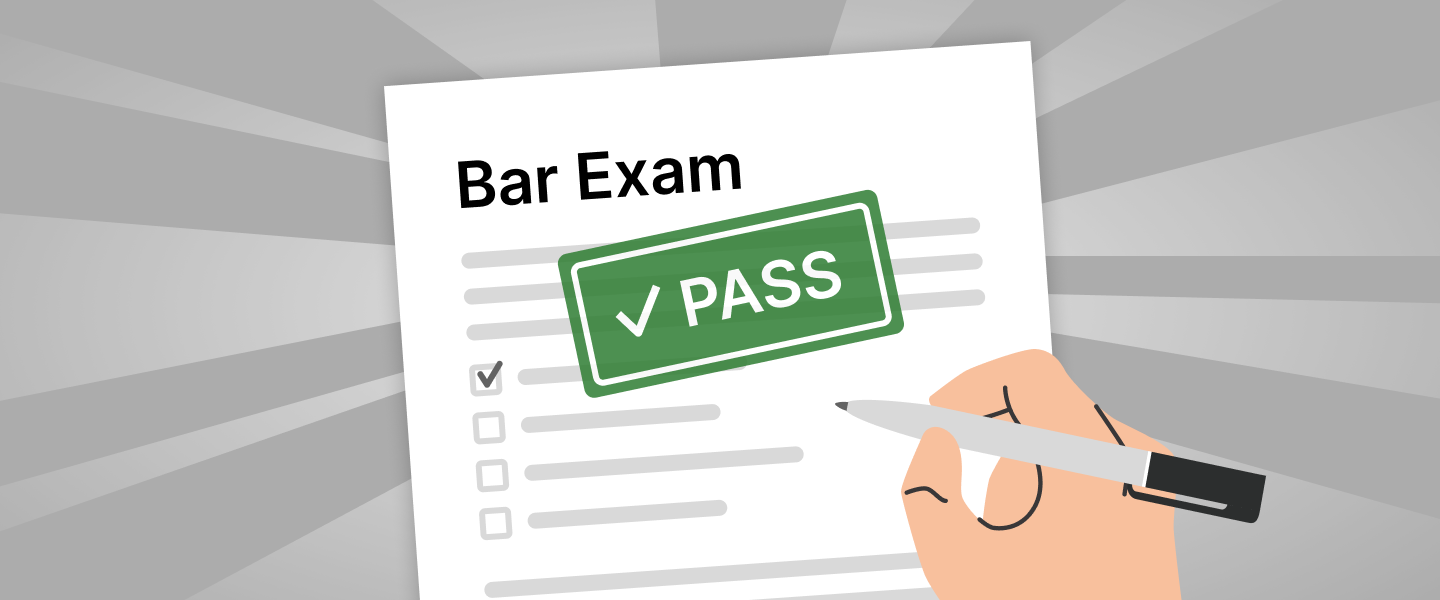Table of Contents
- Law School Essentials: How to Prepare for the Bar Exam
- Which Law School Courses Will Best Prepare Me for the Bar Exam?
- Law school essential #1: Courses that teach bar-tested subjects
- Do I have to take all bar-tested subjects during law school?
- Law school essential #2: Writing courses
- Law school essential #3: For-credit bar courses
- Are Law School Essay Exams Like the Bar Exam?
- Are Law School Multiple-Choice Questions Like the Bar Exam?
- Gearing Up for the Bar Exam
Bar Exam Success
Law School Essentials: How to Use Law School to Prepare Successfully for the Bar Exam

Law School Essentials: How to Prepare for the Bar Exam
Your law school curriculum is designed to get you thinking, speaking, and writing like a lawyer. But here’s what every law student really needs to know: how to choose law school essentials to prepare for the bar exam. Learn which law school courses will set you up for bar exam success and the difference between law school exams and the bar exam.
Which Law School Courses Will Best Prepare Me for the Bar Exam?
Typically, the 1L year is composed of required courses, but after the first year, you should have an opportunity to pick electives. Which classes will best prepare you for the bar exam?
Law school essential #1: Courses that teach bar-tested subjects
Take bar-tested subjects. Prepping for the bar exam feels more manageable if you’ve previously learned the material in a law school course. Size up the bar exam you plan to take and determine which subjects it covers.
Most bar exams incorporate the Multistate Bar Examination (MBE), which tests 7 key areas of law: civil procedure, constitutional law, contracts, criminal law and criminal procedure, evidence, real property, and torts. Sometimes, a single law school course in the subject isn’t enough to match the coverage of the MBE. For example, MBE questions on constitutional law test federalism concepts and individual rights. At some law schools, you’ll need to take Con Law I & II to match this coverage. Consult with your academic advisor if you’re not sure which courses at your school cover the tested subjects.
Many bar exams test additional topics in an essay format. If you’re taking the Uniform Bar Examination (UBE), you’ll need to know 5 additional areas for the essay component of the exam: business associations, conflict of laws, family law, secured transactions (Uniform Commercial Code Article 9), and wills, trusts, and estates. Consider taking courses in these areas.
State-specific exams also test additional topics beyond the MBE. For example, the California bar exam covers a number of California-specific subjects, including community property and professional responsibility. The Florida bar exam covers negotiable instruments (Uniform Commercial Code Article 3) and several Florida-specific subjects. Knowing what your exam entails can help you select courses and go into your bar prep period feeling confident.
Do I have to take all bar-tested subjects during law school?
In a word, no. The bar exam isn’t the only consideration that matters for course selection. You may wish to enroll in essential law school courses that pertain to your career interests or feature an engaging professor. If you skip enrolling in a bar-tested course, you’ll learn that subject during bar prep.
Tackling a subject for the first time during bar prep can be stressful, so choose which courses to skip thoughtfully. Read the course description and consider whether you need the structured learning experience of a law school course or whether you could teach yourself the subject successfully during bar prep.
Law school essential #2: Writing courses
Writing matters on the bar exam. Bar exams commonly feature essay exams, which require you to apply substantive law recalled from memory to given fact patterns, and performance tests, which require you to produce a memo, brief, or other practice-oriented document based on a set of provided legal resources. The written portion typically accounts for a good percentage of your final score. On the UBE, essays and performance tests make up 50% of your overall score.
Strong writers do better on bar exams, so consider taking upper-level writing courses during law school. Your school may offer a broad array of options, including transactional drafting courses and litigation-focused courses like appellate advocacy. The course specifics aren’t crucial. All upper-level writing courses will sharpen your analytical skills and push you to express legal analysis clearly. Writing courses provide good practice for the bar exam.
Law school essential #3: For-credit bar courses
For-credit bar courses are designed to help you transition into postgraduate bar preparation. At some law schools, these courses will be titled to showcase the curricular focus on bar prep. Look for names like Bar Exam Bootcamp, Advanced Bar Studies, or Strategies for the Bar Exam. At other schools, the course title might whisper bar prep instead of shouting it. For example, courses titled Applied Legal Reasoning, Multistate Review, or Uniform Law Survey may cover bar exam subjects and skills. If you’re not sure whether your school offers for-credit bar courses, check with your advisor or the academic-success office.
For-credit bar courses are a great way to squeeze in a bit of early prep before you graduate. In the typical course, you’ll study a subset of bar-tested topics and practice with questions from a real bar exam. Previewing the bar prep experience can help you figure out what study strategies work best for you. Understanding how you’ll learn, memorize, and apply the law covered on the bar exam before the time-pressured crush of bar prep begins is a huge advantage.
Are Law School Essay Exams Like the Bar Exam?
At this point, you’re probably painfully familiar with the typical law school essay exam. You’re presented with a fact pattern—a story chock full of fictional characters who, predictably, do things that provoke application of the law taught in the course. Success depends on your ability to analyze each legal issue that comes up in the fact pattern.
Is it the same on the bar exam? Yes and no. Some aspects of bar essays will remind you of law school. Bar essays contain fictional fact patterns similar to those you’ve seen in law school. You’ll analyze each issue tested using IRAC or a similar writing structure. But other aspects of bar essays may feel like alien territory:
- Time management. Many students taking bar essays feel a bigger time crunch than they did on law school exams. The UBE allots examinees just 30 minutes per essay.
- Endurance. The bar exam may feel like a marathon. You’ll face multiple essays during a several-hour testing session. If you’re taking the UBE, you’ll have 3 hours to tackle 6 essays in a row.
- Multiple subjects. A law school essay exam draws material from a single subject area, but bar essays test a broad array of subjects. In addition, you may see crossover essays, which test more than 1 subject area in a single essay.
- Narrow question prompt. Law school exams often ask a general question designed to test your ability to spot a broad selection of issues in the fact pattern. On the bar exam, you may see several specific question prompts designed to target your knowledge of particular subtopics. Learning how to produce an answer that’s responsive to a narrow set of issues takes practice.
Bar essays are tough, but rest assured you can conquer them. With practice and preparation, you can succeed on your bar exam’s essay component.
Are Law School Multiple-Choice Questions Like the Bar Exam?
Law school multiple-choice questions commonly require you to choose the most likely outcome or most appropriate legal resolution to a matter from the available answer options. For bar exam multiple-choice questions, it’s much the same story.
Even if you’re accustomed to the style of question that will appear on the MBE, the bar exam features some special difficulties. A law school multiple-choice exam will test material from a single course, but the MBE tests 7 subject areas. No question is labeled, so you’ll have to intuit the subject being tested.
Timing is also an important consideration for the MBE. To stay on track, examinees must complete a question in 1.8 minutes. To many examinees, the pace feels quicker than that of a law school exam.
Bar exam multiple-choice questions are challenging, but there’s good news, too. A few question types favored by law school professors won’t appear on the bar exam. Law school professors often use multiple-choice questions to ensure you did the reading or attended certain class discussions. You won’t face those sorts of questions on the MBE. Nor will you see questions that test the holding of a particular case.
Gearing Up for the Bar Exam
What else can you do during law school to gear up for success on the bar exam? Try these tips:
- Know your weaknesses. You can pass the bar exam even if there is a weak spot in your skill set. Maybe you struggle with writing skills, multiple-choice assessments, or a particular subject area. Self-awareness leads to progress. Knowing your weak spots will help you conquer them.
- When faced with struggle, don’t give up. During law school, try to embrace ups and downs in your study so that you’ll be better prepared to dive into bar prep. During bar prep, some study sessions will go swimmingly, and others will result in failure. Aim to adopt a growth mindset. One disappointing result on a law school assignment, midterm, or exam isn’t the end of your story. Learn to use a failure as a springboard to progress.
- Rally your support crew. Friends and family might think that law school graduation marks the end of your journey to becoming a practicing attorney. Prepare your loved ones for the realities of bar prep. Explain that bar prep requires significant time and effort and that you’ll need their continued support.
- Believe you can do it. Reframe negative thoughts and chase away doubts. You’ve succeeded on many exams during your academic career. The bar exam is just one more! All of us at Quimbee are rooting for you.







